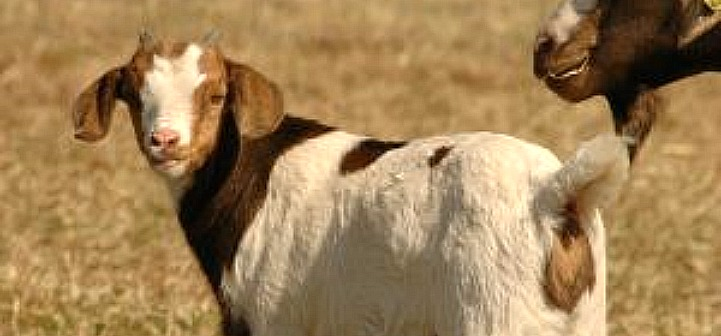Artificial Raising of Kids
Sometimes it is necessary to bottle feed young kids due to death of the mother or the mother’s refusing to take them. Milk feeding of commercial meat goats is usually not economical. It may be avoided by cross-fostering kids onto another doe as described under the goat management section. If a bottle raised kid is with other kids and does, it may learn to steal sufficient milk to raise itself. Kids can be raised on cow milk replacer, the more expensive goat milk replacer, or, if neither is available, cow milk from the store may be used.
It is very important that kids receive colostrum within 12 hours of birth. After 12 hours, antibodies absorption decreases. Colostrum may be milked from another doe that recently kidded. Colostrum contains antibodies that strengthen the immune system for the first months of life. A kid should be fed 1 ounce of colostrum per pound of weight (average birth weight 7 pounds,7 ounces of colostrum) at each of three feedings in the first 24 hours. If the kid is too weak to nurse, it is appropriate to provide the colostrum via stomach tube. This does take some practice, but obtaining colostrum is critically important to kid survival.
Initially kids can be fed using a baby bottle or a nipple such as the Pritchard teat, which fits on a plastic soda bottle. Kids can be bottle fed twice a day, although three times a day the first 4 to 6 weeks of life may increase growth rate. Kids are very susceptible to bloating and other gastrointestinal problems from milk replacers that contain a high level of lactose due to use of dried whey in their formulation. Reduced-lactose milk replacers will reduce bloating problems.
A calf starter feed (with a coccidiostat such as Rumensin or Deccox, sometimes called medicated) and high quality hay should be made available the 2nd week of life. Deccox can be used in the milk from week 2-6 to prevent coccidiosis. After 4 weeks of life, kids can be limit-fed milk at 1 pint in the morning and again in the afternoon. This will stimulate consumption of starter feed and facilitate weaning.
Kids can be weaned after 8 weeks of age if they are consuming 2 ounces of starter per day and weigh two and a half times their birth weight (about 18 pounds). Weaning shock can be reduced by going to once-a-day milk feeding for several days to encourage consumption of the starter.
Reference: Hart, S. 2008. Meat Goat Nutrition. Pages 58-83 in Proc. 23rd Ann. Goat Field Day, Langston University, Langston, OK.
